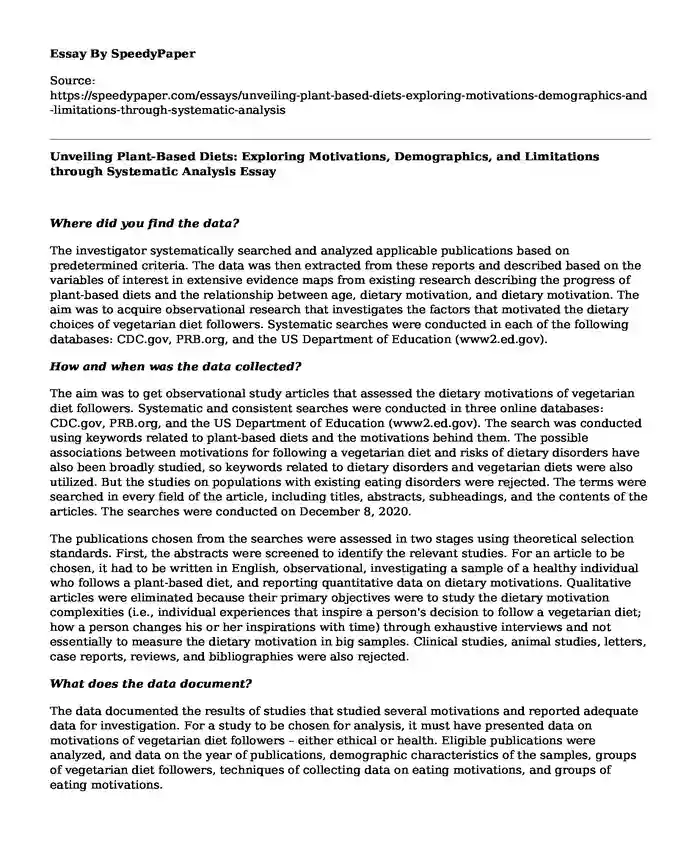Where did you find the data?
The investigator systematically searched and analyzed applicable publications based on predetermined criteria. The data was then extracted from these reports and described based on the variables of interest in extensive evidence maps from existing research describing the progress of plant-based diets and the relationship between age, dietary motivation, and dietary motivation. The aim was to acquire observational research that investigates the factors that motivated the dietary choices of vegetarian diet followers. Systematic searches were conducted in each of the following databases: CDC.gov, PRB.org, and the US Department of Education (www2.ed.gov).
How and when was the data collected?
The aim was to get observational study articles that assessed the dietary motivations of vegetarian diet followers. Systematic and consistent searches were conducted in three online databases: CDC.gov, PRB.org, and the US Department of Education (www2.ed.gov). The search was conducted using keywords related to plant-based diets and the motivations behind them. The possible associations between motivations for following a vegetarian diet and risks of dietary disorders have also been broadly studied, so keywords related to dietary disorders and vegetarian diets were also utilized. But the studies on populations with existing eating disorders were rejected. The terms were searched in every field of the article, including titles, abstracts, subheadings, and the contents of the articles. The searches were conducted on December 8, 2020.
The publications chosen from the searches were assessed in two stages using theoretical selection standards. First, the abstracts were screened to identify the relevant studies. For an article to be chosen, it had to be written in English, observational, investigating a sample of a healthy individual who follows a plant-based diet, and reporting quantitative data on dietary motivations. Qualitative articles were eliminated because their primary objectives were to study the dietary motivation complexities (i.e., individual experiences that inspire a person's decision to follow a vegetarian diet; how a person changes his or her inspirations with time) through exhaustive interviews and not essentially to measure the dietary motivation in big samples. Clinical studies, animal studies, letters, case reports, reviews, and bibliographies were also rejected.
What does the data document?
The data documented the results of studies that studied several motivations and reported adequate data for investigation. For a study to be chosen for analysis, it must have presented data on motivations of vegetarian diet followers – either ethical or health. Eligible publications were analyzed, and data on the year of publications, demographic characteristics of the samples, groups of vegetarian diet followers, techniques of collecting data on eating motivations, and groups of eating motivations.
How does the data relate to your topic?
The data is related to my topic as it shows the sociology of Vegetarianism and the patterns followed in adopting plant-based diets. Different methods were used to group plant-based diet followers in observational studies. The evidence was used to summarize the increasing literature on the adoption of plant-based diets. They also assisted in capturing data on how dietary motivations to follow a vegetarian diet have changed over time. These comprehensive data reduce the uncertainties of classifying vegetarian diet followers using self-report.
What are the limitations of the data?
The definitions of the vegetarian diet were largely inconsistent. The data also did not assess the possible impacts of socioeconomic status and gender on motivations to follow plant-based diets. Also, the categorizing of motivations is not in harmony with all the literature, and some researchers may disagree with the comprehensive health and ethical motivation groups we developed.
Cite this page
Unveiling Plant-Based Diets: Exploring Motivations, Demographics, and Limitations through Systematic Analysis. (2024, Jan 15). Retrieved from https://speedypaper.com/essays/unveiling-plant-based-diets-exploring-motivations-demographics-and-limitations-through-systematic-analysis
Request Removal
If you are the original author of this essay and no longer wish to have it published on the SpeedyPaper website, please click below to request its removal:
- Argumentative Essay Example on the Euthanasia Issue
- Essay Example: The Obstacles that Affect Interoperability of the Disease Surveillance Systems
- Free Essay on Mass Spectroscopy and Electrochemistry
- Essay Example. Most Helpful Treatment Plan Concepts/Ideas
- Essay Sample on Cultural Frameworks for Public Health Nursing
- Public Health Crisis: The Need for Emergency Response Teams - Paper Example
- Samantha Power's Actions towards the Fight of Ebola in West Africa - Essay Sample
Popular categories





